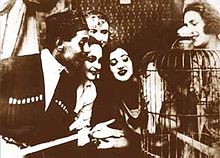Во имя Бога (фильм)
| Во имя Бога | |
|---|---|
 Актеры из фильма "Бисмилла" | |
| Азербайджани : Бисмиллах Русский : Бисмилла | |
| Режиссер | Аббас Мирза Шарифзаде |
| Написано | Pavel Blyakhin |
| В главной роли |
|
Production компания | |
Release dates |
|
Running time | 57 minutes[1] |
| Country | Azerbaijan Soviet Socialist Republic |
| Language | silent film (Russian credits) |
Бисмилла ( Азербайджани : Бисмилла , горит . о религиозном фанатизме и антиисламской теме. [ 2 ] [ 3 ] Фильм был снят в то время, когда произошла борьба с исламской религией в стране . Фильм считался значительным успехом азербайджанской кинематографии и снялся в роли почти все-азербайджани.
Краткое изложение сюжета
[ редактировать ]Фильм проходит до октябрьской революции (1917) в Азербайджане . [ 1 ] Бедный крестьянин (которого называют кули или гулу), является мусульманином -шиитом , который имеет безграничную веру в Бога. [ 1 ] Брат крестьянина - нефтяной работник и приносит с собой своего друга Джафара в свою деревню, чтобы возглавить революционную агитацию через подземные встречи. [ 1 ] Крестьянин посещает одну из встреч своего брата, которая вызвала религиозные сомнения в нем. [1]
The peasant doesn't know what to do with his feelings of doubt and decides to speak with the Mullah, an Islamic religious leader.[1] The Mullah was able to find out from him the names of the participants in the underground meeting from speaking with the peasant. A wave of arrests swept through the village, and among those arrested was the peasant.[1] Once a Revolution takes place and the Bolsheviks arrive, the peasant is empowered and realizes the deception on the part of the Mullah. He decides to take the Mullah to the newly established "People's Court" where he finds justice.
History
[edit]On 22 April 1925, the newspaper Bakinsky Rabochiy wrote that the shooting of the film Bismillah based to the script of Pavel Blyakhin,[4] and entrusted to Sharifzade. The newspaper Kommunist on 27 April, wrote that it, “was filmed with the participation of the Turkic (i.e., Azerbaijani) actors”.[5] On 1 June of the same year, a film studio was opened at the State Film Factory, the director's part of which was headed by Abbas Mirza Sharifzade. Ajdar Nejad, on 31 May 1925 in the newspaper Kommunist, wrote that the movie In the Name of God, which stopped a year before for some reason, had been filming for a month already under the administration of Sharifzade, and that it would be presented no later than 25 July in the honour of Muharram.[6]
On 13 July, the film Bismillah was shown to students, artists and invited spectators. On 24 July, the Berlin cinematographers returning from Iran, being in the photo-cinematography department of Azerbaijan, wished to send the film, along with a number of others, to Berlin. "Sovkino" ordered 12 copies of the film. In October, the film was shown in Moscow too. In Kharkov, 4 copies of this movie were also ordered for Ukraine.[7] Asad Tahir wrote that such Western films as “Muslim Woman”, “Istanbul Beggar”, “The Thief of Bagdad” cannot compete with the film “Bismillah” in terms of the oriental themes presentation, since this movie itself “was filmed in the East, by an "Oriental production", with eastern actors. Aziz Sharif wrote that by shooting the film “Bismillah”, Abbas-Mirza Sharifzade proved that he is a gifted director.[8] The Soviet government actively used this film as anti-Islamic propaganda.
The screenplay writer Pavel Blyakhin continued his anti-religious theme with his film "Judas" (1930) (Russian: Иуда, romanized: Iuda).[9] A related film in this genre is titled, "From Under the Arches of the Mosque" (1928) (Azerbaijani: Iz-pod svodov mecheti; Russian: Из-под сводов мечети) by director Kazimir Gertel (Russian: Казимир Гертель), and stars actor Kamil Yarmatov.
After Sharifzade was executed in 1938, his name was cut from the credits of all the films he shot.[10]
Cast
[edit]- Mustafa Märdanov, a hired servant
- Ibrahim Azeri, as Jafar
- Mirzaagha Aliyev, as Mullah
- Kazım Ziya, as Mullah
- Mohsun Sanani
See also
[edit]References
[edit]- ^ Jump up to: a b c d e f g h "Яндекс". Kinopoisk.ru. Retrieved 2022-10-18.
- ^ История Азербайджана. Vol. III. Baku: Издательство Академии наук Азербайджанской ССР. 1958. p. 482.
- ^ Drieu, Cloe (2019-01-01). Cinema, Nation, and Empire in Uzbekistan, 1919-1937. Indiana University Press. p. 152. ISBN 978-0-253-03787-9.
- ^ Aydin Kazimzade (August 25, 2010). ""Bismillah" filminin 85 yaşı tamam olur" (in Azerbaijani). medeniyyet.az. Archived from the original on October 13, 2021. Retrieved October 13, 2021.
- ^ Mămmădli 1985, p. 117.
- ^ Mămmădli 1985, p. 118.
- ^ Mămmădli 1985, p. 120.
- ^ Mămmădli 1985, p. 124.
- ^ Rollberg, Peter (2016-07-20). Исторический словарь русского и советского кино . Роуман и Литтлфилд. п. 108. ISBN 978-1-4422-6842-5 .
- ^ Эльнур Астанбайли (11 июля 2019 г.). « Бисмиллла» -dan 85 Il Sonra Yaranan Sual: Ateizm Cinayətdirmi? (в азербайджанском). Azlogos.eu. Архивировано из оригинала 4 января 2021 года . Получено 13 октября 2021 года .
Литература
[ редактировать ]- Mămmădli, Gulam (1985). Аббас Мирза Шарифзад [ Аббас Мирза Шарифзаде (коллекция документов, рассказывающих о жизни, творческой и работе) ] (в Азербайджани). Баку : Ишиг. п. 242